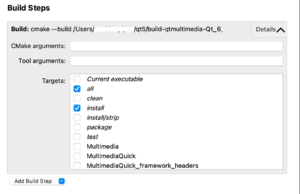Assembly
Assembly '21 and Qt
Assembly and Qt are arranging an special Qt compo in conjunction with our demo, real wild and gamedev competitions. Your task is to make a demo (or game or anything you wish) using Qt. This competition is part of demo/real wild/gamedev compos and the prizes are paid separately on top of any possible other prize from the aforementioned compos. You will participate to Qt competition automatically, if you use the Qt framework and submit your entry to Assembly compos. That is, Qt runtime must be in use in the compo entry.
Eligibility: Using Qt on specified compo entries on demo, real wild and gamedev competitions. Qt employees cannot participate. You must mention use of Qt in the description of platforms & technologies used when you submit your entry.
Platforms: as per above categories
Prizes: 1st place 1.000 eur, 2nd place 600 eur, 3rd place 400 eur. Prizes are paid as part of eligible compos as additional sponsored prizes.
The winners will be chosen by Qt appointed jury. The jury will look how Qt has been used in the entry in addition to creative side of the entry. In case of less than 3 entries in the competition or general quality of entries, jury can decide on different allocation of prizes.
See invitation intro!
This page is landing page for these activities and will be updated regularly, so please check back often.
Qt versions
Qt6; To get the most out from the 3D graphics engine, you should be using the latest Qt (6.2). At the time of writing, Qt 6.2 snapshot does not have multimedia in yet (so you need to build it from source).
Qt5: This is the latest LTS release and despite lacking advanced 3D features, it's fully usable as demo platform if you're applying only shaders. Qt5 also has fully functional multimedia so you can start developing applications easily already today.
Getting Qt
There are many ways to get the Qt installation:
- INSTALLER, this is by far the most easiest way to get a Qt build on your computer. We support Windows, Mac and Linux desktops. https://www.qt.io/download (Open Source Installer: https://www.qt.io/download-qt-installer)
- SOURCE, if you know what you are doing, nice alternative is to get the source and build it from scratch. Qt supports different build environments and has lot of documentation available: Building Qt 6 from Git
Recommended and easiest setup is to use Qt 6.2 from the installer and install Qt Multimedia as separate package.
QML Learning resources
If you are not familiar with Qt/QML, please head over to https://qmlbook.github.io. This is a comprehensive QML with introductions and practical examples. Once familiar with Qt, you can start using Qt6 3D features by following the QtQuick3D documentation found from: https://doc-snapshots.qt.io/qt6-dev/qtquick3d-index.html - notice these are for Qt 6.2.
Shaders
Everybody loves shaders, right? Qt is great platform to do shader programming and for these you might want to head to: https://doc.qt.io/qt-5/qml-qtquick-shadereffect.html
QtMultimedia in Qt6
At the time of writing, QtMultimedia is not finished (in the latest dev build) and not in snapshot release - so it must be compiled manually.
This is best done using Qt Creator, and the steps are:
- Clone the module: https://codereview.qt-project.org/admin/repos/qt/qtmultimedia
- Open CMakeLists.txt from the qtmultimedia directory with Qt Creator
- Make sure you're building 'release' target
- Add install step to the build target setup in Qt Creator (seen in the picture)
- Click 'Build' - Qt Creator will build the multimedia module and will install it to your Qt6 environment:
Troubles ?
If you use snapshot release from installer, basically it's been tested and works a-ok. Usually the problems arise when you go full source. If you go there and cannot get f.ex audio running, you need to make sure all modules are compiled with same toolchain and are up-to-date.
